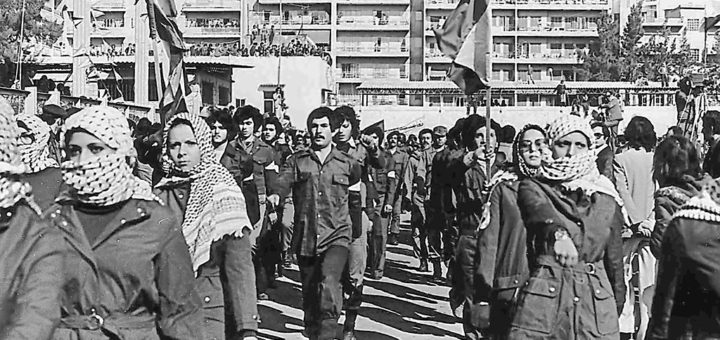The question of the role of youth and students is of particular importance in the current state of the Palestine solidarity movement in the US. Students for Justice in Palestine (SJP) has over 120 chapters nationally and is widely recognized as one of the leading sections of the international solidarity movement as a whole. It is our responsibility as SJPs to not only be content with organizing on our campuses, but to integrate ourselves into the progressive struggles of communities here against US imperialism.

The role of youth and students in building mass movementsYouth and students tend to be open to new ideas and can be a vital revolutionary force. At the same time, the class basis of college students is generally middle class, and students are trained to be individualistic and career oriented. This contradiction manifests itself within the current student movement on the question of student power versus people power.
Upon graduating college most students will join the middle class or return to the working class, but a small section will either join the ruling class itself or become one of its puppets. In either case, students are not an autonomous social force, nor are their political interests independent of the interests of the masses of exploited people. The broad section of students who go off to join the middle and working classes cannot unite with students who side with the ruling class on the basis of being students; students are not a class.
The student movement can provide revolutionary leadership to a larger movement if it is integrated among broader progressive struggles to build power for oppressed people. But if instead the student movement is limited either solely to the specific struggles of students (tuition, student resources, etc.), or is isolating students from their communities instead of uniting them, the student movement becomes non-revolutionary or even counter-revolutionary.
Most importantly, student power obscures the privilege of college students and the importance of rooting political struggle in the broadest and most oppressed sections of the people. An autonomous student movement, which the student Palestine solidarity movement largely is today, is in danger of orienting more and more to middle class student interests and abandoning the struggles of the people. To avoid this danger, we must integrate ourselves and learn from the concrete struggles that the most exploited and oppressed sectors of society are already engaged in, provide our revolutionary optimism and ideology as youth and students to those struggles, and constantly be on guard against middle class interests isolating the student movement and leading it away from serving the needs and interests of the people as a whole.
Note on Internationalism
The tension between supporting the liberation struggle within Palestine and the liberation struggles against imperialism and settler-colonialism of people here in the US marks another critical dynamic within the Palestine solidarity movement.
All struggles against imperialism are connected. Advances of one anti-imperialist revolutionary struggle both objectively strain the resources of oppressor nation(s), and subjectively inspire anti-imperialist struggles around the world by proving these struggles are possible in practice. As SJPs organizing within the center of US imperialism, we are in a position to advance the anti-imperialist and anti-settler-colonial struggles here, and in particular the national liberation struggles of internal colonies within the borders of the US (the struggles for national self-determination of Black people/New Afrikans, Chicanos, First Nations, etc.). By doing so, we will actively advance Palestinian liberation by undermining the ability of the US imperialist state to so extensively support Israel.
SJPs have made significant advances in applying the BDS call, both in expanding the base of the Palestine solidarity movement and in consolidating anti-imperialist and pro-Palestine politics in many SJP chapters. However, if SJPs do not also participate in the progressive struggles of oppressed-nationality people within the US, we perpetuate the isolation of the student movement and will not be able to advance the Palestine solidarity movement beyond each of our campuses.
How can SJPs make advances given the current conditions?Through both our direct experience in New York City and our experience working with SJPs nationally, we have observed that the primary practices of SJPs usually consist of (1) organizing pro-Palestine speakers or panel discussions on campus and (2) organizing boycott and divestment campaigns. These practices have advanced anti-imperialist and pro-Palestine politics on our campuses, but they also reflect and further the isolation of the student movement from oppressed communities. Panel discussions are well suited to students who are eager to learn new ideas, but they isolate people who do not need abstract political discussions, and instead desire involvement in political programs to advance the struggles of their communities. In oppressed communities there are few reasonable institutions to target for a divestment campaign, and boycott campaigns are just as impractical for addressing the concrete conditions oppressed people here are facing. No amount of consumer boycotting will pressure the state to cease its surveillance activities on Arab and Muslim communities, or convince real estate development plans to halt gentrification.
The present isolation of the youth and student movement from oppressed communities cannot be rectified simply by using the same methods of organizing and physically bringing them to the community. SJPs need to revise our methods of organizing to combat the isolation of the student movement and enable us to orient toward the masses. Step by step through practice we can integrate the student movement with the struggles of the people.
At the same time, we can take those revised methods and re-apply them to strengthen the anti-imperialist and pro-Palestine bases on our campuses. For example, many SJP panel events have an overly academic character and do not provide ideas or tools to address concrete issues we face in our organizing. In addition to political and historical discussions of Palestine, campus events must actually spark and train people to do political work.
How we organize and the subsequent political program that is developed out of that must exist in relation to our general political goals as an organization. Without a clear vision of what we are organizing for, our organizing methodologies and strategy will quickly become muddled and lose focus. For SJP chapters in particular, and Palestine solidarity organizations in general, our primary political goal is to hinder the U.S. empire and play our part in organizing for its collapse, because without the lifeline of U.S. imperialism, the settler-colonial state of Israel is not able to exist. This will allow the revolutionary forces within Palestine and the camps as much breathing room as possible to build the national liberation movement there.
Students for Justice in Palestine chapters in New York City organize for this anti-imperialist struggle in one way by linking the Palestinian liberation movement to the Liberate CUNY Front. This campaign aims to open up admissions of the third-largest university system in the United States (City University of New York) to everyone who graduates from a New York City high school, or has a GED, as a form of reparations for oppressed nationalities who continue to be excluded from accessing education.
The First Step: Social Investigation and Class Analysis (SICA) and the Mass Line
We cannot build a base within Palestinian and Arab communities through abstract discussions or BDS campaigns on campus. While these tools, especially BDS, have enabled significant ideological advances in Palestine solidarity, they are insufficiently oriented to material struggle for organizing communities.
In any neighborhood we are organizing, we need to develop campaigns that address the concrete conditions that the most exploited sections of the people are facing, so first we must investigate those conditions. A preliminary step in investigation can include analyzing previously collected data or reading past reports, but we must primarily conduct our own investigation to get to know the community ourselves. Investigation can be informal, just by talking to people on the street about a political campaign, or it can be formal such as through fact-finding meetings.
Investigations must always be guided by an analysis of class society. Only with class analysis can we synthesize what we are learning from our investigation. Based on the results of investigation we can develop a political campaign. The primary issue the community is facing should be the focus of any political campaign. Secondary issues must always be kept in mind because they objectively impact organizing, and if they are not handled well, it will create unnecessary division and weaken the level of unity among the people with respect to the primary campaign.
The political campaign can then be used to continue and deepen the social investigation and class analysis, which in turn may demonstrate that the balance of primary and secondary problems have changed, or that certain aspects of the campaign need to be modified to better suit the concrete conditions.
SICA is a tool of the mass line. To practice the mass line means to take the ideas, demands, and struggles of a community, while they may be scattered and disorganized, synthesize them into a political program and present it back in the form of an organized campaign.
Experience of NYC SJP in Bay Ridge
NYC SJP has confirmed this experience directly in our practice when we engaged in a campaign to boycott Israeli dates during Ramadan in Arab grocery stores in Bay Ridge. The campaign was relatively minor. While several stores pledged to stop buying shipments of Israeli dates, materially it did little, if anything, to impact the flow of any Israeli capital. We engaged in this campaign knowing that even a completely successful campaign of boycotting Israeli dates would put little, if any economic pressure of the Zionist state. It was one campaign in one community in one city, but was valuable in the sense that it brought a concrete anti-Zionist political program to a community historically politically repressed by entrapments and surveillance. Equally important, however, it was part of the ever-continuing process of finding out the what issues the community cared about and was dealing with. It was clear that people we spoke to agreed that the Israeli dates had to go, and generally supported the boycott campaign, but did not see it as something that affected their lives, or were unwilling to engage politically because of the fear of police and FBI terrorism in the form of entrapment and surveillance. Naturally, this led to a deeper understanding of the problems plaguing Arab and Muslim communities in the post-9/11 U.S., one not based on subjectivity or academic scholarship, but on concrete investigation of the conditions that exist to neutralize political activity in the Palestinian diaspora. The knowledge we gained through this campaign will inform our strategy for organizing within this community with the goal of addressing people’s’ needs.
We draw inspiration from revolutionary Palestinian community leader Rasmea Odeh. In addition to organizing generally for the Palestinian struggle in the diaspora, she organizes for immigrants rights and women’s issues. Rasmea’s immigration status was exploited by federal agents when they raided several people’s homes who were engaged in the anti-war movement in 2010. Because of her anti-imperialist work as an associate director of the Arab American Action Network (AAAN), the U.S. empire sees her as a political threat which must be repressed, which is shown in her unjust conviction last year for immigration fraud. Her work established that Palestine solidarity work cannot exist in abstract discussion, but must be rooted in concrete anti-imperialist programs, and as students we must take up the example of Rasmea Odeh and organize with the political goal of the collapse of U.S. imperialism, first and foremost.
Having practices that isolate SJPs from the communities and confine us solely to our campuses renders us historically irrelevant. If we truly aim to provide political leadership, we must have a mass orientation, and we must combat the isolation of the youth and student movement from oppressed communities as well as the student-power liberalisms that maintain that isolation.
